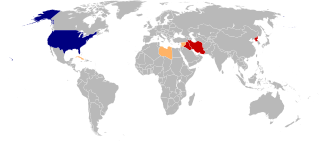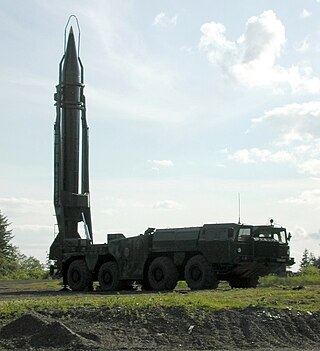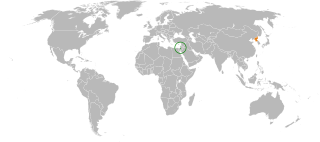Related Research Articles

The Treaty on the Non-Proliferation of Nuclear Weapons, commonly known as the Non-Proliferation Treaty or NPT, is an international treaty whose objective is to prevent the spread of nuclear weapons and weapons technology, to promote cooperation in the peaceful uses of nuclear energy, and to further the goal of achieving nuclear disarmament and general and complete disarmament. Between 1965 and 1968, the treaty was negotiated by the Eighteen Nation Committee on Disarmament, a United Nations-sponsored organization based in Geneva, Switzerland.

Nuclear proliferation is the spread of nuclear weapons, fissionable material, and weapons-applicable nuclear technology and information to nations not recognized as "Nuclear Weapon States" by the Treaty on the Non-Proliferation of Nuclear Weapons, commonly known as the Non-Proliferation Treaty or NPT. Proliferation has been opposed by many nations with and without nuclear weapons, as governments fear that more countries with nuclear weapons will increase the possibility of nuclear warfare, de-stabilize international or regional relations, or infringe upon the national sovereignty of nation states.

The phrase "axis of evil" was first used by U.S. President George W. Bush and originally referred to Iran, Iraq, and North Korea. It was used in Bush's State of the Union address on January 29, 2002, less than five months after the 9/11 attacks and almost a year before the 2003 invasion of Iraq, and often repeated throughout his presidency. He used it to describe foreign governments that, during his administration, allegedly sponsored terrorism and sought weapons of mass destruction. The notion of such an axis was used to pinpoint these common enemies of the United States and to rally the American populace in support of the War on Terror. The countries originally covered by the term were Iran, Ba'athist Iraq, and North Korea. In response, Iran formed a political alliance that it called the "Axis of Resistance" comprising Iran, Syria and Hezbollah. Other countries were later added to the "axis of evil" by US politicians and commentators. The term "axis of evil" is itself a portmanteau of the Axis powers of WWII and the Cold War era “Evil Empire”.

"State Sponsors of Terrorism" is a designation applied by the United States Department of State to countries which the Department alleges to have "repeatedly provided support for acts of international terrorism". Inclusion on the list enables US government to impose four main types of unilateral sanctions: restrictions of foreign aid, ban of weapons sales, export controls of dual-use equipment and other miscellaneous economic sanctions. The State Department is required to maintain the list under section 1754(c) of the National Defense Authorization Act for Fiscal Year 2019, section 40 of the Arms Export Control Act, and section 620A of the Foreign Assistance Act.
In politics, hard power is the use of military and economic means to influence the behavior or interests of other political bodies. This form of political power is often aggressive (coercion), and is most immediately effective when imposed by one political body upon another of less military and/or economic power. Hard power contrasts with soft power, which comes from diplomacy, culture and history.

The Office of Foreign Assets Control (OFAC) is a financial intelligence and enforcement agency of the U.S. Treasury Department. It administers and enforces economic and trade sanctions in support of U.S. national security and foreign policy objectives. Under Presidential national emergency powers, OFAC carries out its activities against foreign states as well as a variety of other organizations and individuals, like terrorist groups, deemed to be a threat to U.S. national security.

Many nations continue to research and/or stockpile chemical weapon agents despite numerous efforts to reduce or eliminate them. Most states have joined the Chemical Weapons Convention (CWC), which required the destruction of all chemical weapons by 2012. Twelve nations have declared chemical weapons production facilities and six nations have declared stockpiles of chemical weapons. All of the declared production facilities have been destroyed or converted to civilian use after the treaty went into force.

United States sanctions are imposed against countries that violate the interests of the United States. Sanctions are used with the intent of damaging another country's economy in response to unfavorable policy or decisions. The United States has imposed two-thirds of the world's sanctions since the 1990s. Numerous American unilateral sanctions against various countries around the world have been criticized by different commentators. It has imposed economic sanctions on more than 20 countries since 1998.

The Nonproliferation Policy Education Center (NPEC) is an American nonpartisan think tank founded in 1994 to educate policymakers, the media, and academics about how to control the proliferation of weapons of mass destruction (WMD). NPEC's policy papers urge the United States government to pursue a harder line with potential proliferators of nuclear arms, in contrast to the more "upbeat view" that the risks of nuclear weapons proliferation can be safely managed as nuclear energy programs become more widespread.

The Iran Nonproliferation Act of 2000 is a United States Act of Congress signed into law by President Bill Clinton on March 14, 2000. The act authorizes the President of the United States to take punitive action against individuals or organizations known to be providing material aid to weapons of mass destruction programs in Iran.

A Scud missile is one of a series of tactical ballistic missiles developed by the Soviet Union during the Cold War. It was exported widely to both Second and Third World countries. The term comes from the NATO reporting name attached to the missile by Western intelligence agencies. The Russian names for the missile are the R-11, and the R-17Elbrus. The name Scud has been widely used to refer to these missiles and the wide variety of derivative variants developed in other countries based on the Soviet design.

United Nations Security Council Resolution 1874 was adopted unanimously by the United Nations Security Council on 12 June 2009. The resolution, passed under Chapter VII, Article 41, of the UN Charter, imposes further economic and commercial sanctions on the Democratic People's Republic of Korea and encourages UN member states to search North Korean cargo, in the aftermath of an underground nuclear test conducted on 25 May 2009.

Israel and North Korea do not have official diplomatic relations, and unofficial communications between the two countries are hostile. North Korea does not recognise Israel, denouncing it as an "imperialist satellite state". Israel in turn does not recognise North Korea and regards South Korea as the sole legitimate government of Korea. Since 1988, North Korea has recognised the sovereignty of the State of Palestine over all of Israel, excluding the Golan Heights, which it recognises as Syrian territory. Israel considers North Korea and its nuclear missile program a major threat to global security and has called for international action against North Korea. North Korea has responded by threatening to "punish" Israel on several occasions.
Jeffrey Lewis is an American expert in nuclear nonproliferation and geopolitics, currently a professor at the James Martin Center for Nonproliferation Studies at the Middlebury Institute of International Studies at Monterey, and director of the CNS East Asia Nonproliferation Program. He has written two books on China's nuclear weapons, and numerous journal and magazine articles, blog posts, and podcasts on nonproliferation and related topics.
China National Electronics Import & Export Corporation (CEIEC) is a Chinese state owned enterprise in diversified business areas. It is one of a handful of defense trading companies authorized to represent the domestic defense production industries in overseas sales, concentrating on sales of defense electronics. It is also in construction engineering specializing in construction of civil infrastructure. By international contracting revenue the company is ranked among the top 250 contractors in the 2015 Top 250 International Contractors published by Engineering News Record. From 2006 to 2008, CEIEC was sanctioned for violations of the Iran, North Korea, Syria Nonproliferation Act. In November 2020, the United States Department of the Treasury levied additional sanctions on CEIEC.
The Caesar Syria Civilian Protection Act of 2019, also known as the Caesar Act, is United States legislation that sanctions the Syrian government, including Syrian president Bashar al-Assad, for war crimes against the Syrian population. The Act was signed into law by President Trump in December 2019, and came into force on June 17, 2020.

U.S. foreign policy during the presidency of Donald Trump (2017–2021) was noted for its unpredictability and reneging on prior international commitments, upending diplomatic conventions, embracing political and economic brinkmanship with most adversaries, and stronger relations with traditional allies. Trump's "America First" policy pursued nationalist foreign policy objectives and prioritized bilateral relations over multinational agreements. As president, Trump described himself as a nationalist while espousing views that have been characterized as isolationist, non-interventionist, and protectionist, although the "isolationist" label has been disputed. He personally praised some populist, neo-nationalist, illiberal, and authoritarian governments, while antagonizing others, even as administration diplomats nominally continued to pursue pro-democracy ideals abroad.

The Countering America's Adversaries Through Sanctions Act (CAATSA) is a United States federal law that imposed sanctions on Iran, North Korea, and Russia. The bill was passed by the Senate on July 27, 2017, 98–2, after it passed the House 419–3. It was signed into law on August 2, 2017 by President Donald Trump, who nevertheless believed that the legislation was "seriously flawed".

The Art of Sanctions: A View from the Field is a 2017 book written by Richard Nephew. It discusses the role of sanctions as a foreign policy tool. Nephew argues about interpreting targets' responses to sanctions based on two critical factors: pain and resolve. When sanctions have achieved maximum effectiveness that lies in the application of pain against a target, but targets may have significant resolve to resist, tolerate, or overcome this pain. The author believes that sanctions have achieved maximum effectiveness resulted Joint Comprehensive Plan of Action.

North Korea–Syria relations have been very strong and close since the 1960s, when North Korea provided military assistance to Syria in its wars with Israel. Both states maintain embassies in the other country's respective capitals.